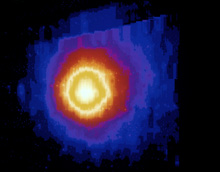NASA Postpones Mission to Visit Asteroids
January 21, 2006
Good evening,
ALICIA CHANG, Associated Press, has an article that is being picked up by
the news papers.
Looks like the DAWN mission is not going to launch this year.
- LRK -
-------------------------------------------------------------
http://www.mercurynews.com/mld/mercurynews/news/local/states/california/northern_california/13680538.htm
Posted on Sat, Jan. 21, 2006
NASA postpones mission to visit two asteroids
ALICIA CHANG
Associated Press
LOS ANGELES - An unmanned NASA spacecraft intended to visit two of the solar
system's largest asteroids will not launch this year, as the space agency
deals with cost overruns and technical issues.
The planned summer launch of the Dawn spacecraft has been indefinitely
postponed, said Andrew Dantzler, director of NASA's solar system division.
Mission managers were ordered to halt work on Dawn last fall while an
independent review team led by the space agency's Marshall Space Flight
Center assessed the project. The team is expected to present its findings to
NASA on Jan. 27.
snip
-------------------------------------------------------------
Read the articles. Looks like not enough money. Problems encountered,
tanks that would hold the xenon for the ion engine not meeting specks and
rupturing during tests.
A DISCOVERY mission, capped at $371 and asking for another $40 million, got
put on hold to look at the books. Doesn't look like it is going to come out
of hold.
This would have been a nine year spiral out to the asteroids.
- LRK -
-------------------------------------------------------------
http://dawn.jpl.nasa.gov/
http://dawn.jpl.nasa.gov/mission/index.asp
Dawn's goal is to characterize the conditions and processes of the solar
system's earliest epoch by investigating in detail two of the largest
protoplanets remaining intact since their formations. Ceres and Vesta reside
in the extensive zone between Mars and Jupiter together with many other
smaller bodies, called the asteroid belt. Each has followed a very different
evolutionary path constrained by the diversity of processes that operated
during the first few million years of solar system evolution.
Dawn has much to offer the general public. It brings images of varied
landscapes on previously unseen worlds to the public including mountains,
canyons, craters, lava flows, polar caps and, possibly ancient lakebeds,
streambeds and gullies. Students can follow the mission over an entire K-12
experience as the mission is built, cruises to Vesta and Ceres and returns
data. The public will be able to participate through the Solar System
Ambassadors and through participation on the web.
snip
-------------------------------------------------------------
Well forget the outreach, forget going to the asteroids. Tanks burst, need
another $40 million.
Seems like we could just do a safety stand down for a day or two in IRAQ and
give them what they need.
- LRK -
-------------------------------------------------------------
http://www.usatoday.com/news/politicselections/nation/president/2004-08-26-iraq-war-clock_x.htm
A billboard in Times Sqaure counts the cost of the Iraq war starting at
$134.5B and increases at a rate of $177M per day, $7.4M per hour and
$122,820 per minute.
By Anders Krusberg, AP
-------------------------------------------------------------
Thanks for looking up with me. (even if it is a future event horizon)
Larry Kellogg
Web Site http://lkellogg.vttoth.com/LarryRussellKellogg/
Bog Spot http://kelloggserialreports.blogspot.com/
RSS link http://kelloggserialreports.blogspot.com/atom.xml
News ltr https://news.altair.com/mailman/listinfo/lunar-update
=============================================================
Your suggestions could show up here. :-) - LRK -
=============================================================
http://abcnews.go.com/Technology/wireStory?id=1529592&ad=true
NASA Postpones Mission to Visit Asteroids
By ALICIA CHANG AP Science Writer
LOS ANGELES Jan 21, 2006 — A NASA spacecraft built to explore two of the
solar system's largest asteroids won't launch this year because the space
agency is dealing with cost overruns and technical issues in the project.
The planned summer launch of the Dawn spacecraft has been indefinitely
postponed, said Andrew Dantzler, director of NASA's solar system division.
Mission managers had been ordered to halt work on Dawn last fall while the
project was assessed by an independent review team, which is expected to
present its findings to NASA on Jan. 27.
snip
http://www.mercurynews.com/mld/mercurynews/news/local/states/california/northern_california/13680538.htm
http://www.kait8.com/Global/story.asp?S=4393109&nav=0jsh
=============================================================
http://www.spaceref.com/news/viewsr.html?pid=18748
NASA Dawn Mission Status November 2005
STATUS REPORT
Date Released: Sunday, November 20, 2005
Source: University of California Los Angeles
Christopher T. Russell
Dawn Principal Investigator, UCLA
In mid-October, the Dawn mission team was asked by NASA Headquarters to
cease all work except that which was critical to maintaining the viability
of the Dawn mission to launch on a delayed schedule, still achieving all of
its scientific objectives. This action was taken in response to concerns
about the availability of funding in FY2006 to cover any problems that might
arise during environmental and performance testing, particularly with regard
to several pieces of subsystem hardware perceived to have experienced
significant problems. The chief items of concern are the Power Processing
Units (PPUs) that provide the high voltage power to the thrusters in the ion
propulsion system, one of the redundant Attitude Control Electronics (ACE)
boxes, and the xenon tank.
Concern regarding the flight xenon tank arose because two qualification
tanks ruptured at lower than expected pressure during testing, instigating a
thorough review of the integrity of the flight tank. The Dawn team chose to
reduce the xenon load in the flight tank from 450 to 425 kg to increase the
safety margin (reducing a generous fuel load margin but not affecting the
science return). A recommendation from the group charged with reviewing the
Dawn tank, chartered by the NASA independent Technical Authority guidelines,
is expected in early December.
snip
http://www.space.com/missionlaunches/051107_dawn_qown.html
=============================================================
http://www.newscientist.com/article.ns?id=dn8284
NASA’s asteroid-visiting probe put on hold
17:28 08 November 2005
NewScientist.com news service
Kelly Young
An ambitious NASA mission to visit two of the solar system's largest
asteroids has been placed on hold while investigators assess budget and
technical problems.
The mission, called Dawn, was scheduled to launch in June 2006 to study
asteroids Vesta and Ceres. But mission controllers have been told to stop
their preparations while the investigation is conducted. This process is
expected to take several months but the mission's launch window lasts over a
year, so the delay should not affect the spacecrafts chance of reaching its
targets.
"Rather than just continue and hope for the best […] we at headquarters
thought it would be a good idea to stand down," says Andrew Dantzler, the
director of the Solar System Division at NASA headquarters in Washington DC,
US.
Dantzler says the project has experienced more technical failures than
normal and mission managers are working to determine if there is a problem
with the way the programme is being run. In addition, the project is already
running 10% to 16% over its projected budget of $373 million.
The mission has also begun falling behind schedule. The spacecraft is still
officially scheduled to launch as early as 17 June 2006 but, before the
stand down, the launch date was already expected to slip to August 2006. "It
wasn’t clear that we were even going to make August," Dantzler admits.
snip
=============================================================
http://en.wikipedia.org/wiki/Dawn_Mission
Dawn Mission
>From Wikipedia, the free encyclopedia.
The Dawn Mission is a NASA unmanned space mission that will send an orbiting
space probe to examine the asteroids Ceres and Vesta. Dawn will be the first
mission to enter into orbit around two different planetary bodies other than
the Earth and Moon.
[edit]
Mission
The mission's goal is to characterize the conditions and processes of the
solar system's earliest epoch by investigating in detail two of the largest
protoplanets remaining intact since their formation. Ceres and Vesta have
many contrasting characteristics that are thought to have resulted from them
forming in two different regions of the early solar system; Ceres is
theorized to have experienced a "cool and wet" formation that may have left
it with subsurface water, and Vesta is theorized to have experienced a "hot
and dry" formation that resulted in a differentiated interior and surface
vulcanism.
Dawn will be launched on a Delta 7925H rocket. To cruise from Earth to its
targets it will use three DS1 heritage Xenon ion thrusters (firing only one
at a time) to take it in a long outward spiral. The planned chronology is:
Launch on June 17, 2006
Vesta arrival October, 2011
Vesta departure May, 2012
Ceres arrival August, 2015
End of operations January, 2016
An extended mission in which Dawn explores other asteroids after Ceres is
also possible.
The Dawn mission team is led by UCLA space scientist Christopher T. Russell.
Orbital Sciences Corporation will construct the spacecraft, and NASA's Jet
Propulsion Laboratory will provide the ion engines and management of the
overall flight system development. The German Aerospace Center will provide
the framing camera, and the Institute for Space Astrophysics in Rome will
provide the mapping spectrometer. A laser altimeter will be provided by the
NASA Goddard Space Flight Center, a gamma ray spectrometer from the DOE Los
Alamos National Laboratory, and a magnetometer will be provided by UCLA.
Delay
snip
==============================================================
==============================================================
WHAT THE MIND CAN CONCEIVE, AND BELIEVE, IT WILL ACHIEVE - LRK
==============================================================
Many folks would like to see us back on the Moon and developing its resources.
Saturday, January 21, 2006
Subscribe to:
Post Comments (Atom)





No comments:
Post a Comment
Note: Only a member of this blog may post a comment.